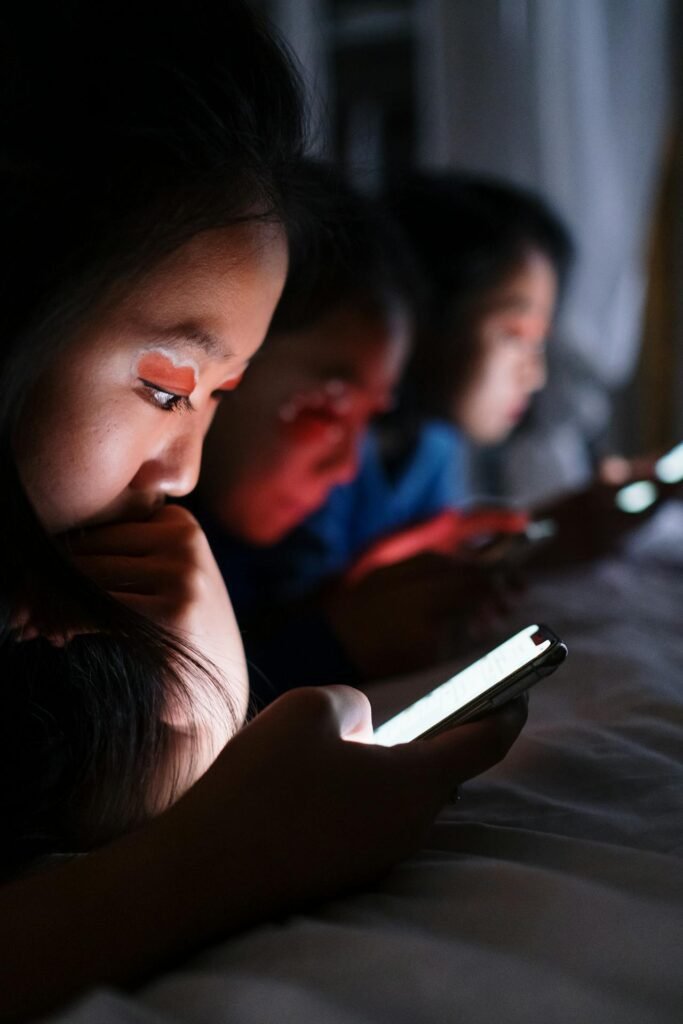Have you ever reached for your phone to check the time or one update, only to find yourself buried in your smartphone—scrolling Instagram or Tiktok or watching videos—for 45 minutes? If that applies to you, don’t worry; you’re not alone! Phone addiction has quietly blossomed into one of the most widespread behavioral addictions affecting all populations in today’s digital world—from teens to working adults.
Initially, smartphones were built to make our lives simpler: bringing us together, being informative, and being entertaining. At some point, this balance has shifted. Now we find ourselves checking our phones hundreds of times daily, most of the time without thinking twice about it.
If you’re struggling with distraction in general, building self-discipline makes a huge difference in regaining control of your daily life.
The average American spends between three and five hours on his/her/their smartphone.
This daily usage does not include work-related time surrounded by your smartphone. That’s 1,500 plus hours a year!These screen hours lead to decreased productivity, mental fatigue, shallow interpersonal relationships, poor sleeping, and higher levels of anxiety and depression. Our smartphones, which once brought functionality to our lives, are now a source of endless distraction and even addiction.But what is phone addiction? How do we know when our usage has turned into damage and harmful uses? And most importantly, what can we do about it?
In this post, we’re going to explore the science and psychology of phone addiction—what causes it, how it affects you, and what you can do about it. So if you’re looking to reduce your screen time or even start from scratch, this guide will help you begin your journey towards a happier, calmer, and more productive life.
What is Phone Addiction? Understanding Phone addiction
Phone addiction (also called smartphone addiction or problematic phone use) is a behavioral pattern of excessive phone use where someone is obsessed with using their phone, often to the point in which their phone use interferes with aspects of everyday life. Being addicted to your smartphone is more than heavy and excessive use of your device; it means that the individual has lost control of when to engage, and what to engage with, on their device.
While phone addiction is not formally classified or understood as a medical disorder (in most diagnostic manuals), mental health practitioners are beginning to recognize it as a real and identifiable issue. Phone addiction appears to share commonalities with other forms of behavioral addiction, such as compulsive gambling or gaming addiction; in these forms of addiction, the brain is hijacked by reward; emotional arousal; and stimulation. Smartphones are literally designed (or coded) to keep us engaged.
Social media applications; games; videos; and notifications are manipulated to trigger reward response; which is dopamine, in our brains, the same dopamine system that contributes to pleasure and habits. The accumulation of filtered, immediate self-gratifying “hits” changes how we think; act; and feel.
Below presents a few key indicators that you may be addicted to your phone:
- You feel anxious, restless, and/or irritable if you cannot access your phone (nomophobia).
- You reach for your phone first thing in the morning and last thing in the evening.
- Spending hours mindlessly scrolling through apps such as TikTok, Instagram, or YouTube.
- Neglecting family, friends, or responsibilities because of your phone.
- Feeling guilty, frustrated, or regretful about your phone use, yet still doing it anyway.
Phone addiction can sneak up on you. You’ll notice that something that began once in a while has become a constant habit, disrupting your sleep, your mental well-being, productivity, and your relationships.
The good news is that once you understand what phone addiction is and how it works, you can reclaim some level of control. It starts by acknowledging the issue at hand; that admission is step number one and the most important.
In the next section, we’ll explore the underlying causes of phone addiction—and why it can be so complicated to put down your phone even when you want to.
Causes of Phone Addiction: Why You Can’t Put It Down

If you want to break the cycle of phone addiction, it’s critical to understand its origins. At first, it may feel like harmless scrolling, but phones are built to keep you hooked, and they are adapted for a reason.
- One of the largest triggers of phone addiction is the way phones adjust your brain chemistry. Apps are designed to push dopamine, a brain chemical associated with pleasure and rewards, when you are notified, liked, or messaged. This reward loop conditions your brain to crave more stimuli, even if those stimuli have no meaning at all.
- Another major cause is fear of missing out (FOMO). Social media platforms regularly present curated glimpses of people’s lives, so if you aren’t checking in regularly, you feel as if you are missing out. This sense of psychological pressure leads to compulsive behaviors and creates emotional dependency.
- Feeling bored is another significant factor. Phones provide immediate, on-demand entertainment: videos, games, memes…the list never ends. So, when we find ourselves bored or with temporary downtime, many people will reach for their phones. Over time, you’re conditioned to do so, and reaching for your phone becomes automatic.
- Loneliness and social anxiety are just two more factors in the mix. Many users depend on their phones to escape from direct interaction or to gain some validation from the virtual world. Messaging, likes, and comments may feel like social engagement, but they are often shallow and fleeting.
- There is also a problem with boundaries. If there are no screen time limits or digital rules, your phone will ultimately be your companion all the time; during meals, your commute, or even in the bathroom. This constant access reinforces unhealthy habits.
- Finally, mobile apps are designed for addiction; elements such as infinite scroll, autoplay, and targeted subject matter create a scenario where you are unaware of the passing of time.
Identifying these covert forces is a first step to your liberation. In the next sections, we will discuss how phone addiction affects your brain, body, and relationships, and the hazards of ignoring the addiction.
Effects of Phone Addiction: The Real Cost of Excessive Screen Time
Checking your phone may seem harmless, but the addictions caused by using your smartphone can become serious and damaging. From your mental health to your relationships, there is a slow erosion of areas of life caused by overuse of a smartphone—often without your knowledge.
- One of the worst is the effect on mental health. Research demonstrates a clear link between screen time and anxiousness, depressive symptoms, and stress. Constant notifications, social comparisons, and FOMO (“fear of missing out”) can lead to overstimulation of the brain and feelings of overwhelm, inadequacy, and emotional depletion.
- Cognitive performance is also negatively affected. Routine use of smartphones can directly inhibit your cognitive skills to focus, think deeply, and retain information. The act of multitasking information, multitasking messaging, apps, and notifications is teaching your brain that immediate gratification is better than sustained attention. Consequently, as a person experiences excessive digital appetites, productivity and academic performance decreases, decision fatigue increases, and sustained attention wanes.
- Physical health is also indirectly affected. Increased use of smartphone devices is linked to poor sleep quality, and particularly screen time before bed. Blue light that emits from screens inhibits your brain’s melatonin, making it more difficult to fall or stay asleep. Indirectly, a person’s posture (or lack thereof) from a phone or screen, eye strain, or repetitive stress injuries (i.e. “text neck”) all have an impact on both mental and physical health.
- Worse yet are the social effects. Phone addiction can erode relationships. What would otherwise be a genuine conversation in real life is supplanted with a meaningless online experience. When you are present but literally glued to your phone during a meal, conversation, or social event, it sends the message that whatever is happening online matters more than the people in your vicinity.
- Ultimately, addiction to your phone could result in emotional numbness. The constant need for stimulation makes real life so much less exciting that you become disconnected from the current moment, denied the experiences that may have been meaningful contributing to positive feelings of self-worth.
It’s important to know the extent of these effects. In the next section, we will consider how to determine if you have a phone addiction and the signs you should never ignore.
Signs You’re Addicted to Your Phone: 10 Clear Warning Signals
Do you think that you might have crossed the boundaries of how you spend time on your phone? Recognizing phone addiction signals is the first step to regaining control of your life. Smartphones are a regular part of life today; the issue arises when they are overused, leading to dependency, which could happen easily and likely without acknowledgement.
Here are 10 common signs you might be addicted to your phone:
1. You feel anxious or irritable without your phone. Even a short separation provokes feelings of anxiousness or restlessness (a symptom of nomophobia).
2. Your phone is the first and last thing you look at on each day. You wake up holding your phone and go to bed with it in your hand.
3. You get lost scrolling and forget how much time has passed. Scrolling through social media, games or the latest videos goes from minutes to hours before you even realize it.
4. You check your phone during inappropriate interactions. During conversations, at meals, meetings and sometimes while driving.
5. You feel phantom vibrations. You think your phone buzzed or dinged when in fact it never did. This is a psychological sign to let you know that you might be dependent on your phone.
6. You ignore key responsibilities – Work, school, or household tasks are neglected because of screen time.
7. You use your phone to avoid emotions – Feeling sad, bored, or stressed? You grab your phone so you don’t have to think.
8. You conceal or lie about your usage – You feel ashamed or embarrassed about your usage.
9. You are snacking your sleep away – You are up late scrolling or checking your phone while lying in bed, distracting you from sleep.
10. You’ve attempted to cut down and are unsuccessful – You notice your usage, and even though you know or have been told to reduce it, you find it difficult to do so.
If several of these descriptions resonate with you, it is time to evaluate your relationship technology. In the next section, we are going to walk you through strategies that have been shown to help combat phone addiction and reclaim your life!
How to Overcome Phone Addiction: 10 Tips to Help You Get Your Life Back
If you are looking for ways to overcome phone addiction, you are not alone. Millions of people around the world face the same challenge of feeling stuck in a vortex of endless scrolling, ringing notifications, and distractions on our phones. The reassuring part? You can get out of this predicament.
Here is an extensive, step-by-step approach to take control of your screen time and reclaim your focus, productivity, and sanity:
1. Admit There is a Problem. The first step in overcoming addiction is admitting there is a problem. Be real with yourself about how your phone use is affecting your life in a negative way–for instance, by harming your productivity, damaging relationships with friends or family, or affecting your mental health. Do you know that a person who doesn’t see something wrong usually does not change?
2. Keep Track of Your Screen Time. , Take advantage of the built-in screen time apps, such as Screen Time for iPhone or Digital Wellbeing for Android. Pay attention to what apps you use the most and, on average, how long you spend on your phone each day. Once you have this information, you can understand yourself and know what changes to make and where.
3. Apply Limits and Boundaries to Your Phone Use (and Believe Yourself)After monitoring your behavior for a week, limit your social media screen time, game screen time, and entertainment app screen time. This could involve using apps to limit your use, such as Freedom, Stay Focused, or Forest, or by leaving the phone in another room as you go about your day.
4. Establish No-Phone Areas .Create designated spaces where phones are not permitted, such as your bedroom, dining room table, or bathroom. By doing this, you can limit mindless scrolling and observe real-life events.
5. Turn Off Non-Essential Notifications. Every ping or buzz you receive is only going to entice you to look at your phone. Turn off the push notifications for apps that are not urgent like Instagram, TikTok, or YouTube. These simple steps can help to reduce your desire to check your phone unnecessarily.
6. Switch to Grayscale: Change your phone setting to grayscale to get rid of the bright colors that entice you to use it. Having a dull screen can help break the emotional attachment to your phone.
7. Replace Your Phone Time with Healthy Habits. Instead of turning to your phone while you are waiting, read, journal, exercise, meditate, or spend time with friends or family. Developing new non-screen hobbies will not only lessen your time on screen, but you will feel happier overall.
8. Use Your Phone with Intention. When you reach for your phone, ask yourself: “Why am I doing this?” Is it out of boredom, anxiety, or habit? Taking pauses to intentionally approach your technology gives you possibilities to make more mindful choices instead of mindlessly scrolling.
9. Schedule a time and unplug from your phone Committing to a few hours unplugged from your phone, a day, or a week and see how you feel.
.10. Seek Help if Needed. If you find that phone use feels unmanageable and you are unable to lessen it without help, please talk to someone. A therapist or group working in the area of digital wellness, but there is a lot of help with your questions.
Life Post Phone Addiction: Restoring Balance and Calm Life
After you move on from phone addiction can be extremely liberating.
Once your smartphone has less of a hold on you, you may be surprised (as were the previous guests at Life After Phone Addiction Retreats) at some of the mental, emotional, and physical benefits that come when you live your digital life in a more balanced way.
You may first begin to notice an increase in your mental clarity and focus. Having cut down on your overall time on your phone, you may become less distracted and more focused on some of the things (and/or responsibilities) that need your attention. This may lead to increased productivity and a sense of accomplishment.
Your social interactions will become more significant. When you aren’t asked to check your phone every time there is a pause in the conversation, you can give your complete attention to friends, family, and coworkers. You may find yourself, the next time you are in a social situation, spending less time fidgeting with your phone or feeling bored and increasing time engaging in real-life relationships.
Your physical health may also benefit from a reduction in your time spent, and position with, a phone. As you will no longer be hunched over a screen in multiple positions, you may experience decreased neck/upper back pain, eye strain (increased screen time can worsen your eyesight) and sleep disturbances (excessive phone use at night can affect sleep).
Your life after phone addiction may allow opportunities for self-discovery and personal growth. You happen to find you now have time to participate in hobbies, exercise, self-care or risk trying something totally new.
For those lucky enough to find a more fulfilling or balanced life post phone addiction, congratulations!, please acknowledge your strength. It is important to cultivate and maintain your healthy phone habits moving forward. Set boundaries, treasure real-life opportunities and become an advocate for a digital detox.
It can be difficult to overcome phone addiction, but it is worth the effort. By understanding the drivers, noticing the symptoms, and implementing techniques, you can stop the excessive screen time. You will regain mental clarity, improve relationships, and learn to enjoy being present in the moment. Keep in mind recovery from phone addiction is not going to happen immediately.
Recovery is about taking small and consistent steps to change your habits with your phone. You can use tools such as screen time tracking apps, do digital detoxes, and establish boundaries so you feel in control of your digital life.
Your productivity, mental wellness, and physical health will thank you. If you are ready now to begin the journey to a more balanced lifestyle, take the first step now. Begin by trying one of the suggestions above and sticking to phone-free time every day. Share your experiences with us in the comments, facing challenges or success. We would love to hear from you! Do not let a phone control your life. Take charge today and start living your life in a healthier way!




One Comment on “Phone Addiction: How to Break Free and Reclaim Your Focus and Mental Health”